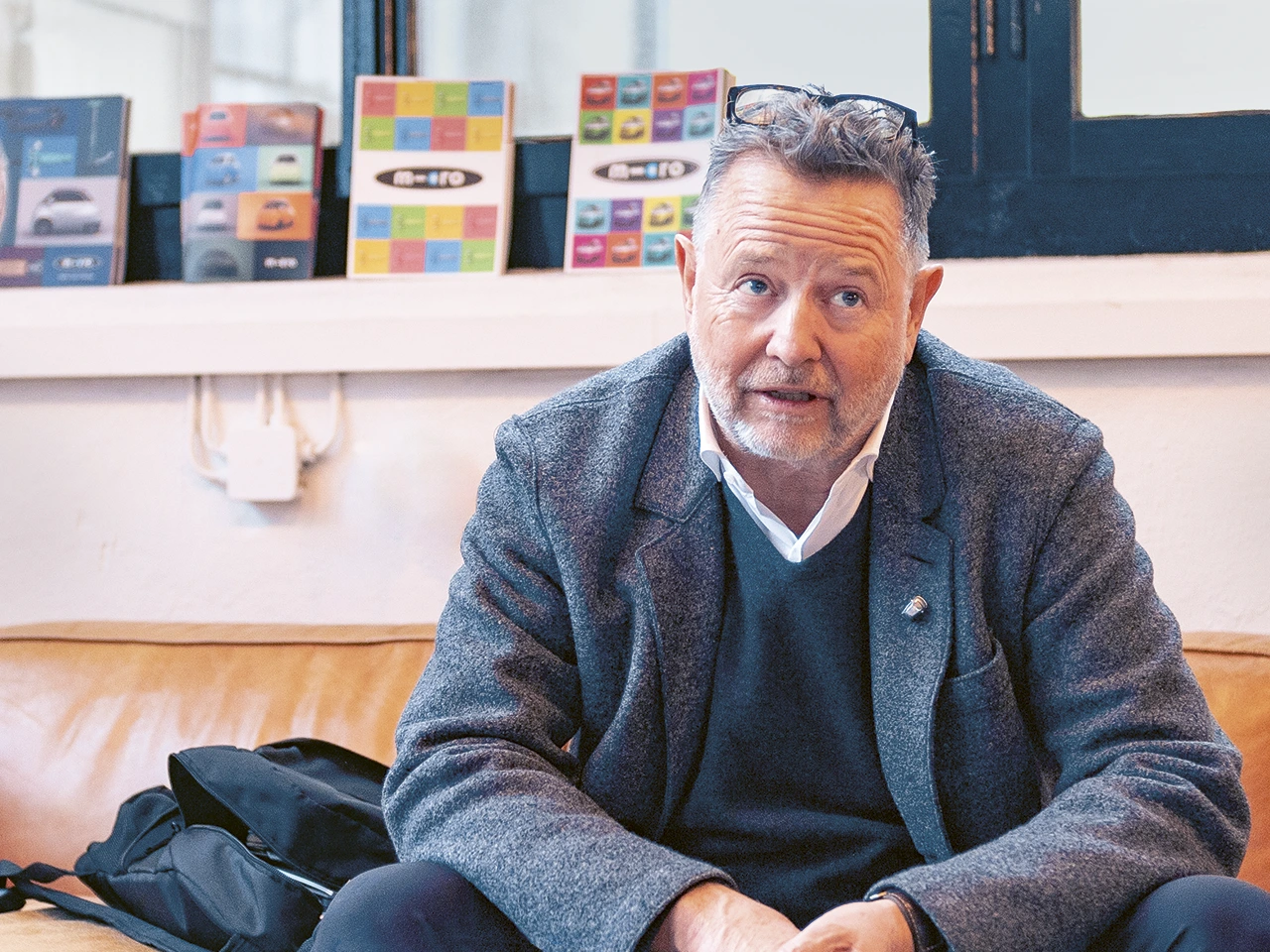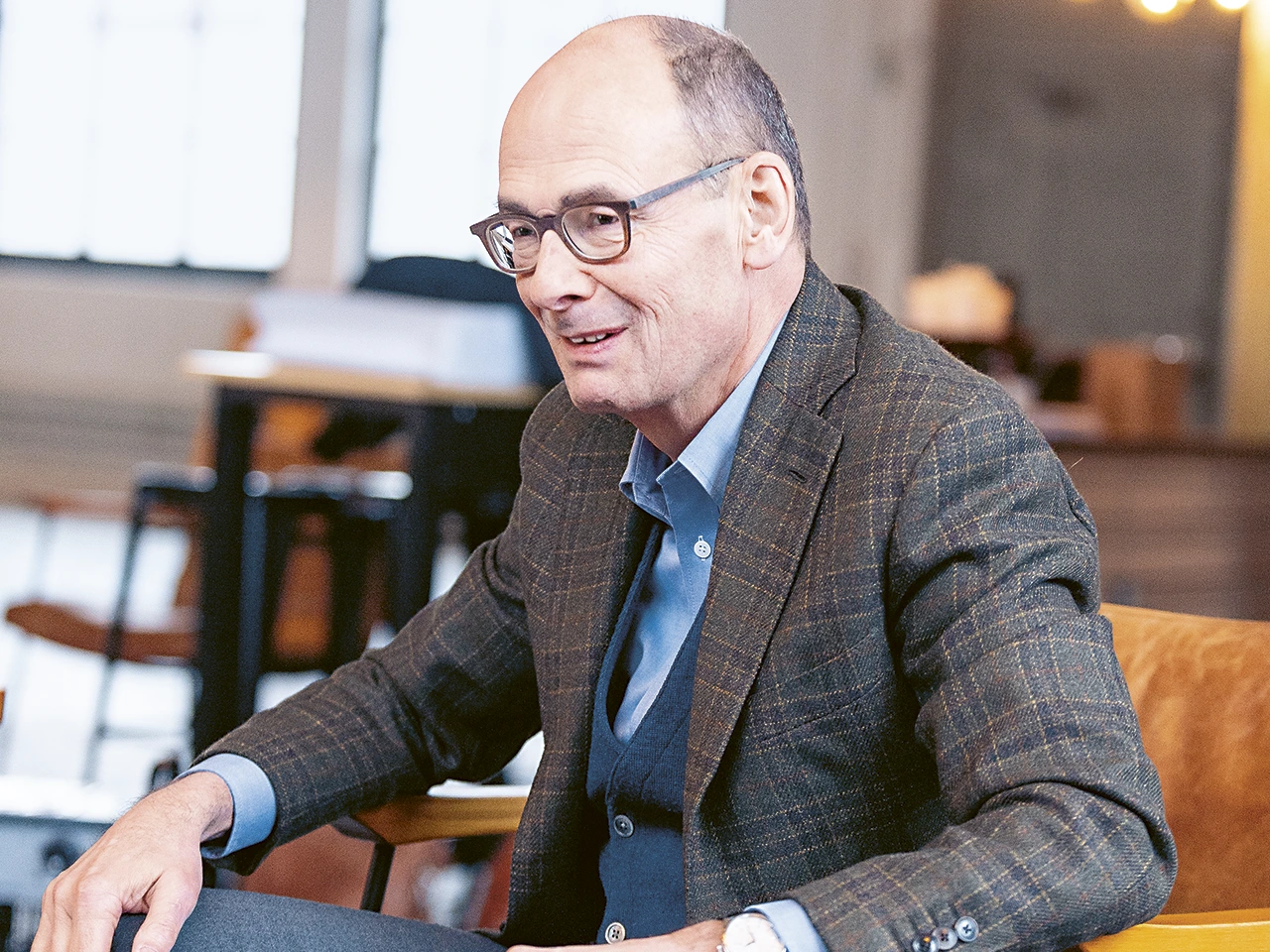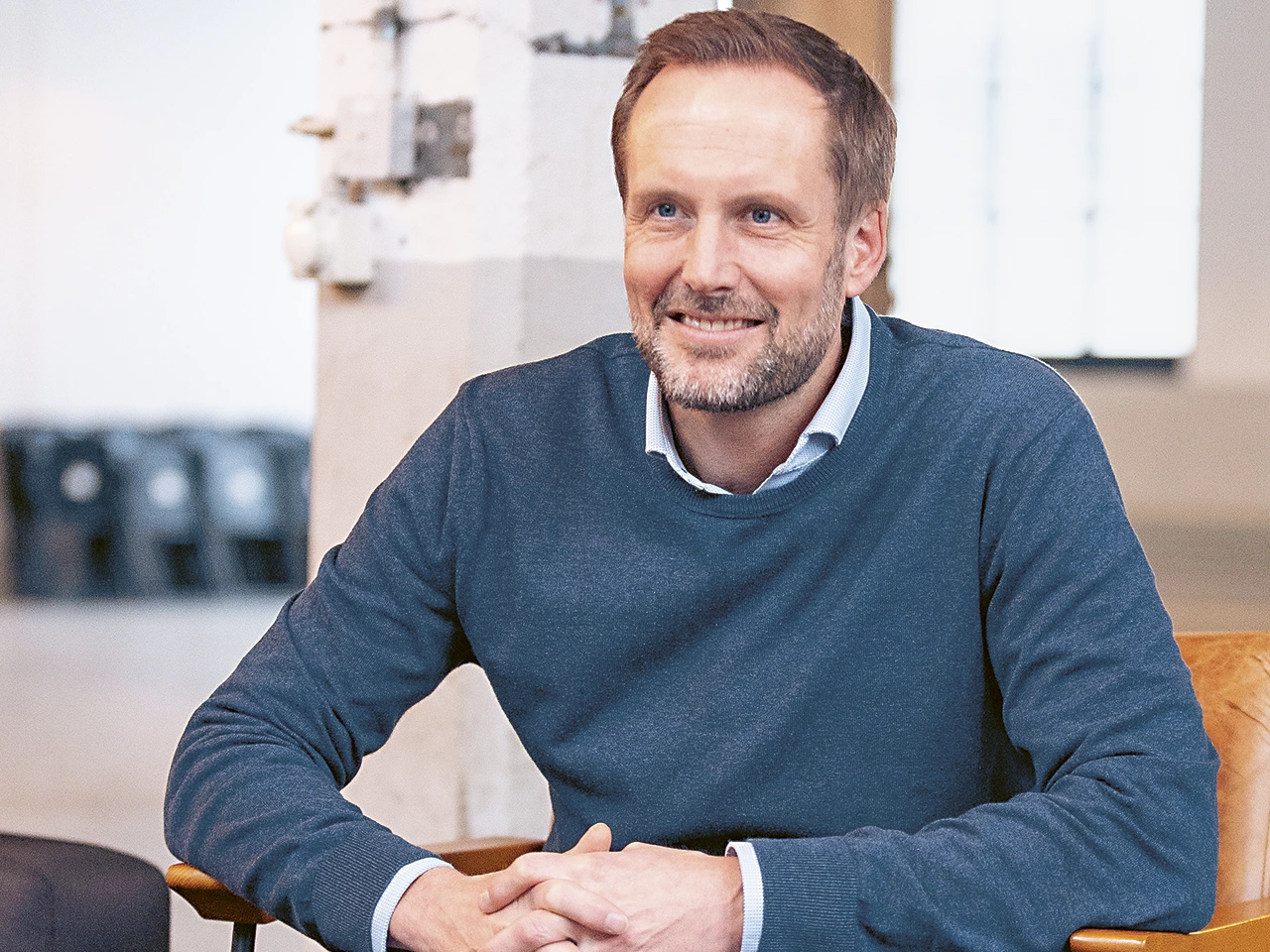Home > Company > Publications > Wim Ouboter
Resilience through innovation – Generating opportunities from crises
Every human endeavour involves the risk of failure. Thoroughbred innovator Wim Ouboter had to experience this several times in his life. Time and again he encountered resistance, but nothing could stop him. He resolutely pursued his vision of contemporary, sustainable mobility.
Today, the family business Micro Mobility Systems AG, headquartered in Küsnacht near Zurich, provides a wide range of micro-vehicles and related products. The company has a turnover of around CHF 80 million and sells its products in over 80 countries around the world.
How has Wim Ouboter repeatedly managed to emerge successfully from crises? In an interview with Daniel Bachofen, Managing Director at Bachofen AG, and Andreas Bachmann, Head of Sales at Bachofen AG, the tireless creator reveals what drives him.
Daniel Bachofen: Mr Ouboter, how did you become an innovator?
Wim Ouboter: First of all, I would like to say that I was a lousy student. I was the class representative, but I always got the worst marks. The reason was probably my dyslexia. Back in my school days, this was not taken into account when marks were awarded. If you were labelled a failure in the school system at the time, you were left behind.
DB: And how did you overcome this?
WO: I thought that if I was perceived as a failure at school, then I would have to focus on other strengths. I realised that my talent lay in motivating people to do a job three times better than I could do it. It suits me to pull the strings in the background.
Andreas Bachmann: What does innovation mean to you?
WO: I always ask myself: How can I enter a blue ocean market? In other words, a market where there is still no price war, where you can still earn money with a new product. Until competitors appear and tear each other apart. Then it’s time for the next innovation. This cycle is also reflected in our company history. Right from the start, we have come up with an innovative product each year.
DB: You talk about invention. Innovation would then be what emerges from the implementation…
WO: Exactly. For me, the focus is always on implementation. Fantasising, waiting for flashes of inspiration, grabbing a notepad and sketching — none of that produces innovation.
AB: How do you feel about the risk of failure?
WO: To break new ground, you have to take that risk. If you want to be part of a sure-fire business, become a hairdresser. Nothing against hairdressers. Some people have more hair, others less, but everyone has to go to the hairdresser and the business keeps running. It’s different when you really set your sights on something new by saying to yourself: I’m going to create a need, a new market. And launch a product that fulfils that need.
DB: Is that what happened with your scooter, as you describe?
WO: Yes, it began with the story of Smart in 1999. It was called “Reduced to the Max” and “The Future of Mobility”. The Smart only requires a third of a parking space and you can park it right in front of the cinema. But there are no parking spaces in front of the cinema, so the Smart driver still has to walk a few steps. So we said to ourselves: Let’s give him a scooter, small and also “Reduced to the Max”. We built a prototype and I really enjoyed riding around on it. We then presented it to the people at Smart and they at least found it interesting.
DB: When you’ve finished one project, are you already thinking about the next one?
WO: For us, being innovative borders on obsession. We are currently working on 15 projects at the same time. For example, we are in the process of reinventing the rollator: a rollator that doesn’t look so much like a rollator and has an integrated shopping bag. We are also working with Samsung, who are producing a GPS tracking device that we are integrating into the scooter.
AB: Comparable to Apple’s AirTag?
WO: Correct. When the kids are out and about on the scooter, the parents know where they are. Or you can recognise where the device is if it has been stolen. Incidentally, it was Samsung that approached us and not the other way round. It’s exciting, of course, to work with such global brands. It immediately raises our small company to a higher level.
DB: Where do you stand with the Microlino?
WO: We have separated the Microlino project from the scooter business and are in contact with potential investors. For example, we are in talks with the CEOs of Amag and Rolex and groups such as Kering. A Saudi prince family has also shown interest. That takes the whole thing to a higher level. At the moment, we are financing the Microlino project through the scooter business, which is still going well. We have a turnover of around 80 million and sell the products in over 80 countries.
AB: The motto of our interview is “Resilience through innovation – generating opportunities from crises”. What was the biggest crisis you experienced?
WO: The COVID-19 pandemic hit us badly. After all, we have a factory in Italy and, as we all know, you can’t do everything from home. Then there are the currencies, which are going crazy. We also suffered from the disruptions in global supply chains and the rapidly rising freight costs. We paid up to CHF 18,000 for a container delivery from China. There’s no more profit to be made from the products. Then there have been two wars, not to mention the shortage of skilled labour. The last three years have certainly been the most difficult in my professional career.
AB: That brings me to the next question. What is your secret to overcoming a crisis?
WO: It’s the power of positive thinking. Firstly, you must avoid getting caught up in a downward spiral. Secondly, you should team up with strong partners and identify synergies together. It’s helpful to think out of the box, in other words think about what else might be possible. I had a meeting today at the Swiss Museum of Transport in Lucerne. They rolled out the red carpet for me, so to speak, and invited me to make my presence felt as a Swiss car manufacturer with the Microlino. It was also possible to organise test drives and much more.
DB: Your sons Oliver and Merlin have been working in the company for some time now. How does that work?
WO: We agreed at the time that my sons would complete a gap year in the company after their school leaving exams. They both did well and were both enthusiastic about our vision. When my younger son Merlin joined, the Microlino project, which was still a vision at the time, was just taking off: He travelled to China with a student from the Zurich University of Applied Sciences (ZHAW), where he built two prototypes and put out feelers for a manufacturing partner.
DB: You have already successfully implemented numerous innovative products and have gone through various crises. You know from experience that opportunities will always come your way. Where do you get the certainty that the world won’t end?
WO: There’s no point worrying about things that you can’t change. I also read far fewer newspapers than I used to because there’s a lot of negativity in them. And there’s something else: In a crisis, the main thing you have to do is make sure you have enough cash. Even as a boy, I was careful to save enough that I wouldn’t have to work for a year. That gave me freedom in my decisions.
AB: In addition to liquidity, what else is important to remain successful in times of crisis?
WO: Motivation within the team must never be compromised. Especially in a crisis, it is crucial to focus on the positive and not get upset about what has gone wrong. That was also the case when it came to getting the Microlino ready for series production. This job was done by my two sons, who work extremely well together and respect each other despite, or perhaps because of, their different characters and personalities. I can also count on the full support of my wife, who does the bookkeeping.
AB: What role did your business partners play in times of crisis? Were they part of the problem or part of the solution?
WO: Clearly part of the solution. We always maintain long-term relationships with our supply partners. When we experienced a downturn in the scooter business, we returned the surplus screws. Conversely, one of our suppliers and its team looked for ways to make its product cheaper. Basically, I asked our partners to accommodate us if they wanted to stay in business.
AB: I’m impressed that you managed to develop the Microletta while the Microlino project was in limbo. I think to be innovative you have to be free of burdens, so that innovative spirit can unfold unhindered.
WO: Fortunately, the traditional scooter business continued to flourish. The aim was to keep the employees of the halted Microlino project on board. I was able to motivate them with the exciting Microletta project and the associated contacts with designers. That’s the power of positive thinking.
DB: Can innovation and the industrial production of an innovative product be based in the same company? These are two different pairs of shoes…
WO: Initially, I focused entirely on innovation, delegated industrial production to partner companies and placed our orders with them. I actually only had a marketing and logistics office. I now know what industrialisation means. Now it affects me directly when sales of a product erode. Perhaps I have to confess that I used to earn my money a little too easily because I wasn’t responsible for production. Industrial production, with its huge investments in equipment and human resources, really has a completely different dimension.
AB: For example, tool costs in the multi-millions…
WO: If you focus on marketing and logistics, you can develop the business and if it stops working, close up shop. As a producer, you can’t just walk away. That’s a completely different responsibility.
DB: One last question: What advice would you give Wim Ouboter if you could go back 40 years? What would you do differently?
WO: I would certainly involve lawyers earlier for important contracts. Especially when things aren’t going so well, you’re at a disadvantage with bad contracts. So less handshaking and more security through a solid legal structure. I was a bit stingy when it came to securing contracts and was penalised for it with costs for later legal disputes.
DB: Finally, I would like to give you a huge compliment. If the lawyer thing is the only thing you would do differently, you should be really proud of your story.
WO: If I may also allow myself a final word: We can only counter global warming if we are prepared to leave our comfort zone. Rethinking is the order of the day. An electric motor alone is far from sustainable. We need to reduce the weight and size of our cars. The Microlino is in line with this approach. Our concept is certainly a step in the right direction.
The interview took place on the 9 January 2024 at the Micro Brandhouse in Obermeilen, Switzerland.
Wim Ouboter, a Swiss with Dutch roots, is a lateral thinker in a positive sense. He scraped through school, did an apprenticeship as a banker – which he found particularly boring – and made the decision to break out of the norm. "Go West, young man", an inner voice whispered to him, so off he went to the USA. Back in Switzerland, he successfully completed a bachelor's degree in economics. But the innovative spirit had taken hold of him and wouldn't let him go. The subject of micromobility became firmly established in his mind and became his life's ambition.


